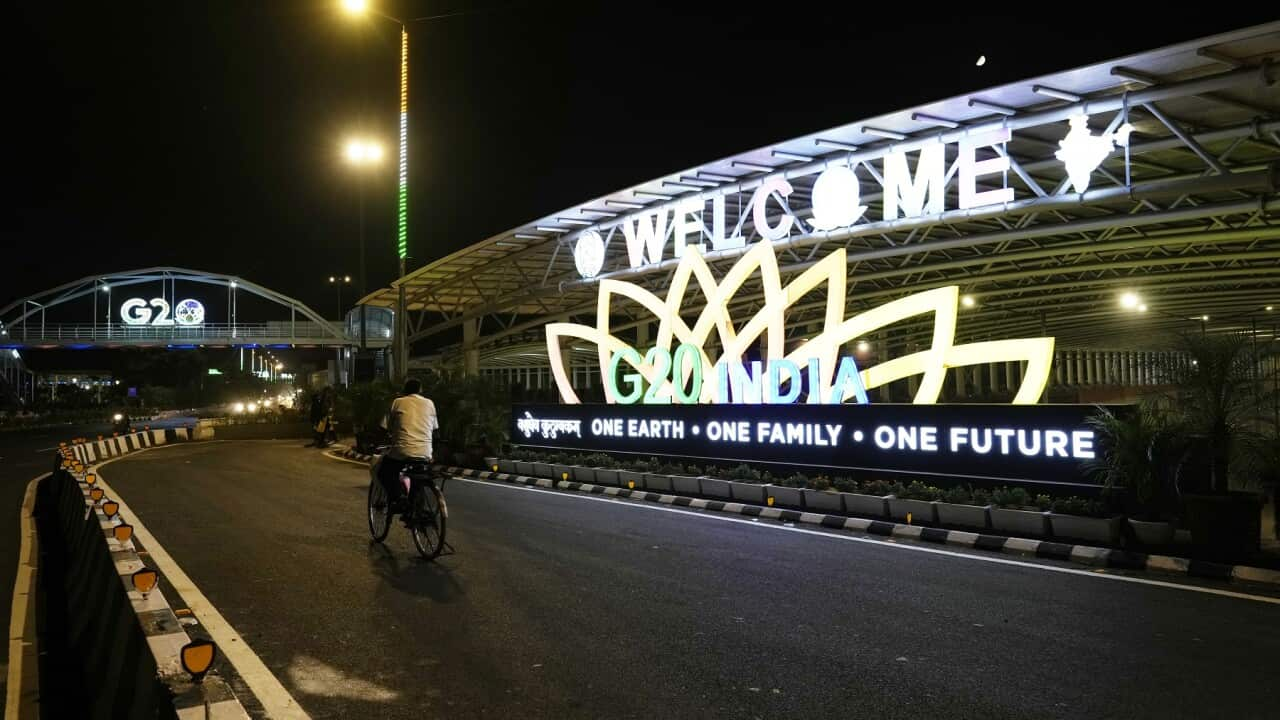TRANSCRIPT
This is the first time a Chinese leader will miss the G20.
Since its creation in 1999, the yearly summit has been attended by every Chinese president, including Xi Jinping himself.
The summit takes place every year in a different country, and this Saturday it will open in New Delhi for two days of talks between the leaders of 19 countries, plus the European Union and invited countries.
So why is Xi Jinping not coming?
Doctor Jennifer Hsu is a Senior Visiting Fellow at the University of New South Wales, and she noted the tensions between Xi and Indian Prime Minister Narendra Modi.
“There is concern about Xi not attending as being a snob towards India. But we do know that India and China had clashes on their borders and this G20 summit comes at a difficult time.”
Jared Mondschein of the United States Studies Centre at the University of Sydney concurs.
“There is, I think, some issues about the way that India and China have gone along recently, or really, haven't got along! As much as the US and Australia have welcome India's participation in the QUAD with open arms, you can say they were pushed there by Xi Jinping and his aggressive foreign policy!”
This also happens just after the BRICS summit, where India and China are also prominent members - and China invited more countries to join BRICS, something that worries India.
Jennifer Hsu again:
“There are concerns among the BRICS that China is trying to make this a very China-centric consortium of actors and we've seen Xi Jinping being very active in bringing new members that are going to be very friendly to China and in many ways depending on trade with China.”
Jared Mondschein concludes the recent BRICS summit exposed this tension between Beijing and New Delhi.
“India has a long history of being seen as a voice for the so-called Global South, especially given its history with the Non-Aligned Movement. So I don't think India is too keen on diluting its power within BRICS.”
So, his beef with India may have dissuaded Xi from coming.
But it also happens as the Chinese economy is facing a series of downturns.
Deflation, crises in the real estate sector, crackdowns on private businesses and loss of confidence in investors, not to mention rising unemployment especially among young people - all of this is weighting on Xi's shoulders.
Wen-ti Sung is a non-resident fellow at the Atlantic Council's Global China hub.
“We know the Xi Jinping era has been principally about increasing the centralisation of power. But one thing that is logical to him is that so many more decisions now have to be made by the Party's centre, a lot of time it means personally decided by President Xi Jinping.”
He thinks this means ventures into foreign affairs are becoming more dangerous for the Chinese leader.
“Before the BRICS summit a few weeks ago, Xi had only been abroad once in a year. We could reasonably expect that President Xi will travel less and less. As President Xi is becoming more indispensable to the daily running of China's governance itself, it's more costly for President Xi to go out to international troubles.”
So, no time for going abroad?
Michael Green,the Chief Executive Officer of the United States Studies Centre at the University of Sydney, also thinks international visits may expose him to criticism.
“Although India and China are both in the BRICS together, the fact is their strategic rivalry is deepening. And Xi did not feel obligated to hand a victory to Prime Minister Modi. And probably also would have been weary of a gathering where many of the leaders would have criticised China for its economic performance and its treatment of investors.”
He thinks this G20 could have been an embarrassing experience for Xi.
“Chinese economic performance is weak, criticism of China is on the rise, and particularly, India, as host of the G20, would not attack China but as hosts of the G20 it's not going to go out of its way to insulate China from criticism from the US or Australia or European leaders.”
But what exactly is the G20 about?
The G20 is like the G7 and BRICS, a forum, which means it is just a big meetings of leaders.
They will talk, and potentially agree on things, but this is not the UN, or NATO, or the European Union, with their binding agreements and their administrations.
Still, Jared Mondschein says it has a record of bringing governments to act in front of global crises.
“It has a history of aligning governments, and making key decisions, may it be during financial crises, or COVID, the G20 definitely has a role.”
What Xi Jinping is missing, is basically a good chance to meet other world leaders.
For Australia, it may also mean a missed opportunity for Prime Minister Anthony Albanese to meet his Chinese counterpart.
For Michael Green, the feeling was probably not mutual.
“I think the most opportunity loss would be with Australia where Prime Minister Albanese was looking to this G20 summit as part of the rebuilt of its relationship with China. Clearly this was not a major fact for Xi Jinping deciding whether to go or not.”
And U-S President Joe Biden also lamented the missed chance for discussions between the two world leaders, as noted by Jared Mondschein.
“President Biden made it clear that he was hoping to meet with Xi Jinping at the G20 but again, Xi Jinping runs his own show and has decided against that.”
But otherwise, the G20 should proceed normally and suffer little from Xi's absence, as explained by Michael Green.
“I don't think that Xi Jinping is going to cause the G20 to collapse, or weaken, he is sending Li Qang, his Premier, so I don't think he's threatening the G20 or the G7 or any other institution.”













